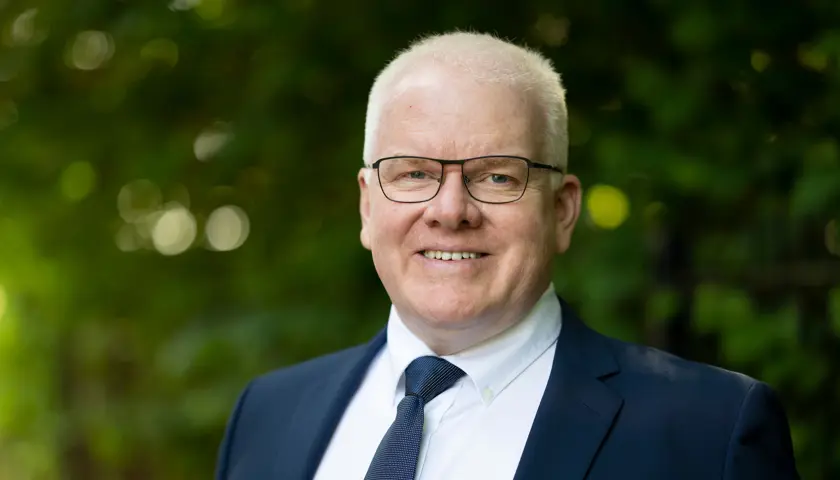Plea to save surgeries
Plea to save surgeries
91 one per cent of GPs unable to meet patient demand, finds survey, as BMA Wales launches second phase of campaign to aid primary care
‘If general practice falls, the rest of the NHS will follow.’ That’s the stark warning from Gareth Oelmann, chair of the BMA Welsh general practice committee.
As Wales loses its one hundredth GP practice since 2012, he is calling for an urgent rescue package to prevent more practices from closing their doors, putting further pressure on a system already creaking.
‘GPs from across Wales have shared their experiences with me, and we are all united in our fears about the future of general practice,’ says Dr Oelmann. ‘GPs have told me about the impact on their own health and wellbeing, and their huge concerns for their patients. It’s heartbreaking.’
Dr Oelmann was speaking as BMA Cymru Wales launched the second phase of its Save Our Surgeries campaign in the Senedd, and revealed the results of a survey which paints a shocking picture of the state of general practice.
The survey shows that 91 per cent of GPs feel they are routinely unable to meet patient demand owing to unsustainably high workloads affecting the availability of appointments, while 87 per cent fear rising workloads are affecting patient safety.
With the loss of 100 surgeries, GPs are now seeing up to 35 per cent more patients each, causing burnout and forcing GPs to cut their hours to less-than full-time just to survive on a personal level. More than half of GP partners are planning to leave in the next three years, and three-in-10 salaried GPs intend to work less-than full-time.
The vast majority (80 per cent) of GPs also expressed great concern about the financial viability of their practices – something GPC Wales believes is a direct result of sustained under-investment. Only 6.1 per cent of the NHS Wales budget is invested directly into general medical services, down from 8.7 per cent in 2005/06.
The Save Our Surgeries campaign is calling for a fairer portion of the NHS budget, and for safeguards to protect GPs and patients including a national maximum standard of patients per day. It also wants a workforce strategy to improve retention and recruitment of GPs and measures to address staff wellbeing.
‘With 95 per cent of GP respondents to the survey telling us they feel negatively about the future of the service, and some only giving it a year to survive, inaction is not an option,’ says Dr Oelmann. ‘I’m afraid without a fairer portion of NHS funding, the situation is grave.’
Keziah Maizey, a GP partner in North Cardiff, says the level of demand on services has never been higher – and that the nature of care is more complex as patients experience longer waiting lists in secondary care (see 'Record waiting times' below).
She describes 12-hour working days with no break, leaving her ‘absolutely done for’, and concerned of the effect tiredness could have on patient safety. She also points to financial concerns for her practice resulting from last year’s below-inflation uplift for general practice in Wales.
‘Despite having a great team of partners, doctors and practice staff the situation with funding feels so precarious in terms of resources and what we can deliver and yet demand rises and the level of care more complex, general practice really is on a knife edge now.
‘If I was a GP starting out again, I would definitely consider emigrating to practise medicine where there was less pressure and a better funded healthcare system. Sadly it’s not a career I would recommend to my children because of how much it takes out of you.’
Llinos Roberts and Richard Brown were forced to hand back the keys to their partnership at the Tumble practice in Carmarthenshire where Dr Roberts had been a partner for 12 years. Successive attempts to recruit partners and salaried GPs failed, meaning the practice was no longer sustainable.
‘For the last few years there were only three partners when we had previously been a stable six-partner practice. This meant working long hours trying to offer the best possible care for our patients,’ Dr Roberts says.
‘Sadly, we had to make the difficult decision to give notice on the partnership. This decision was not taken lightly and caused considerable stress, worry and guilt, but ultimately, we felt we had no choice. We knew that we were delivering a good service for our patients but without a secure future we just couldn’t see a sustainable solution.’
A Welsh Government spokesperson said: ‘General practice plays an incredibly important role in the health service and is highly valued by the public and by us. We recognise the pressure GPs face and have heard the strength of feeling from the Save our Surgeries campaign. We are investing in new ways for people to access primary care services, including community pharmacy and the 111 helpline, to help relieve some of that pressure.
‘Our investment in GP services has been increasing year on year – we invested an extra £20m last year, on top of £12m over three years to support practices to improve access to services.’
Record waiting times
The Welsh Government has admitted to ‘another disappointing set of NHS performance figures’ as hospital waiting lists reached an all-time high.
In May 2024 there were 787,900 open patient pathways (this is the description because a person might be waiting for more than one treatment), with the proportion waiting less than six months falling to 54.8 per cent. Just under 22,500 had been waiting more than two years.
There were also missed targets on waits for outpatient appointments, diagnostics, and therapies.
A Welsh Government spokesperson said cabinet secretary for health and social care Eluned Morgan had made it clear to health boards that she expects to see sustained progress to reduce long waits and waiting times for treatments. ‘She will be making it clear to the leadership of health boards that the situation is not acceptable and must improve.’






